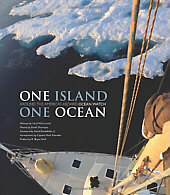  One Island, One Ocean
One Island, One Ocean
Ocean Watch and the Epic Journey Around the Americas
Herb McCormick, photos by David Thoreson
Weldon Owen Inc., 240pp, $35.
One Island, One Ocean is the extravagant, exuberant (most of the time) and emphatically impressive account (both pictorial and verbal) of a 13 month multi-ocean journey. The Bruce Roberts 64' steel hull cutter, Ocean Watch sailed from Seattle, Washington, north through the Northwest Passage, then south around Cape Horn and back to Seattle.
Ocean Watch was skippered by Mark Schrader, who had completed two single handed circumnavigations before he was forty. Crew included Herb McCormick, who has logged over 75,000 miles in his sailing career and also happens to be an award winning writer specializing in all things marine. Photographer, David Thoreson, also a seasoned sailor, provides page after page of breathtaking photos that will awe and inspire; in many cases they are printed in two-page spreads...that presents the reader/viewer with a 10" x 23" photograph. Any number of these will take your breath away. R. Bruce Seidl, President and CEO of Pacific Science Center accompanied the sailors as educator.
Behind the effort (and on the boat) was David Rockefeller, Jr., founder with David Treadway of Sailors for the Sea, which they created in response to the Pew Commission 2003 report on the declining health of our American (both South and North) waters. The book is meant to document the importance of ocean conservation...and does so in high style.
Don't worry about being preached at. First and foremost this is an adventure story and McCormick tells it in the plain-spoken style of a diarist. The book is divided by the regions through which Ocean Watch sailed: "North to the Ice", "The Long Slog South", "Cape Horn to Starboard", and "Closing the Circle"...back to Seattle.
Each leg of the journey presents its own challenges. The Seattle to Newfoundland passage "via the Arctic Circle and the widening Northwest Passage" was dark and lonely, punctuated by visits to the vanishing natives (both human and animal) and ice berg alerts. "To the Inuit people, climate change is not a topic for debate. For decades, they've witnessed radical alterations in ice, land, water, and wildlife."
Finally turning south, "(A)fter a ten day passage dodging gales and ice bergs, the haven of St. John's, (Newfoundland) was like an oasis in a desert." Sailing along the eastern seaboards of both the North and South American continents the crew continuously shared what they were learning via lectures, presentations, boat tours and school visits. These visits are part of the photographic narrative and are often quite moving.
Of particular interest to the sailors/investigators/teachers are the world-spanning ocean currents. As Donovan Hohn observed in Moby Duck (April/2011) the currents connect all the oceans on the globe and affect each other as well as the land masses (which in turn influence the currents, especially temperature and salinity).
After an arduous journey around Cape Horn, (the "wrong" way in terms of difficulty) Ocean Watch sailed the economical and environmentally battered coast of Chile. In a chapter called ""A Prayer for Fragile Chile" McCormick observed that "(W)hile it was true that local challenges and threats to coastal environments differed from place to place, it was also apparent that the long term effects...were surprisingly similar. Whether it was algal blooms, overfishing, salmon farming, or loss of sea ice, communities were being redefined...From the Alaskan Village of Shishmaref to the Chilean town of Puerto Eden, people were heading, in literal and figurative terms, to higher ground."
Though this specific message is an unmistakable downer, the whole, almost overwhelming argument of the book is an un-ignorable rallying cry and the photographs make the argument in favor of cleaning up our act more eloquently than any combination of words. We live on a breathtakingly beautiful planet that supports a spectacular variety of life. What the flying fish are we doing to it?
Released on November 15th, One Island, One Ocean was clearly meant to be the penultimate Christmas gift for all the salts in your life. They won't be disappointed.
P.S. Also especially recommended for Christmas giving, reviewed this year: The Wave by Susan Casey (July) and The Skiff, The Scow and the Footbridge by Arch Davis (May)
|